- Jura Intensiv
- RA - Ausbildungszeitschrift
- RA Digital
RA Digital - 01/2016
- Text
- Jura
- Intensiv
- Inhaltsverzeichnis
- Beklagten
- Recht
- Einwilligung
- Urteil
- Gemo
- Bescheid
- Beschluss
30 Öffentliches Recht
30 Öffentliches Recht RA 01/2016 II. Rechtfertigung des Eingriffs Der Eingriff ist gerechtfertigt, soweit er durch die Schranken des Art. 10 EMRK gedeckt ist. Art. 10 II EMRK dürfte im deutschen Recht am ehesten einem qualifizierten Gesetzesvorbehalt entsprechen. Rechtfertigung verlangt dringendes soziales Bedürfnis. Mitgliedstaaten steht Beurteilungsspielraum zu, der jedoch nicht unbegrenzt ist. Wenig Raum für Eingriffe, wenn Äußerung sich auf politische/öffentliche Themen bezieht. Schutz der Reputation der betroffenen Ärzte durch Art. 8 EMRK. Hinweis des EGMR, dass Abtreibungen nach deutschem Recht, wie von B behauptet, rechtswidrig, aber nicht strafbar sein können. Aufmachung des Flugblatts veranlasst sorgfältigen Leser nicht zu der Annahme, das Verhalten der Ärzte sei strafbar. 1. Vorliegen einer Schranke Art. 10 II EMRK verlangt für Beschränkungen der Meinungsäußerungsfreiheit, dass diese „gesetzlich vorgesehen“ sind. Gesetzliche Grundlage für das gerichtliche Verbot sind §§ 823 I, 1004 I BGB. Weiterhin muss die Beschränkung einem der in Art. 10 II EMRK genannten Ziele dienen. Das ist hier der Schutz des guten Rufs. 2. Verhältnismäßigkeit Der Eingriff in die Meinungsfreiheit muss schließlich gem. Art. 10 II EMRK in einer demokratischen Gesellschaft notwendig sein, d.h. dem Verhältnismäßigkeitsgrundsatz genügen. Das von den deutschen Gerichten verhängte Verbot dient dem legitimen Schutz der persönlichen Ehre der betroffenen Ärzte und ist dafür auch geeignet und erforderlich. Fraglich ist jedoch die Angemessenheit des Verbots. “[52] […] The adjective ‘necessary’, within the meaning of Article 10 § 2, implies the existence of a ‘pressing social need’. The Contracting States have a certain margin of appreciation in assessing whether such a need exists, but it goes hand in hand with European supervision, embracing both the legislation and the decisions applying it, even those given by an independent court. […] [53] Another principle that has consistently emphasised in the Court’s case-law is that there is little scope under Article 10 of the Convention for restrictions on political expressions or on debate on questions of public interest. [54] The Court further reiterates that the right to protection of reputation is protected by Article 8 of the Convention as part of the right to respect for private life. […]” Jura Intensiv Unter Zugrundelegung dieser allgemeinen Erwägungen ist hinsichtlich der Aussagen auf dem Flugblatt festzuhalten, dass sie mit der Abtreibung ein öffentliches Thema betreffen, also besonders schutzwürdig sind. „[60] The Court notes that the German law, under section 218a of the Criminal Code, draws a fine line between abortions which are considered to be “unlawful”, but exempt from criminal liability, and those abortions which are considered as justified and thus “lawful” […]. It follows that the applicant’s statement that “unlawful abortions” had been performed was correct from a judicial point of view. [61] The Court moreover considers that – although the leaflet’s layout was clearly designed to draw the reader’s attention to the first sentence set in bold letters – the very wording of the applicant’s further explanation, according to which the abortions were not subject to criminal liability, was sufficiently clear, even from a layperson’s perspective. Although the assessment and interpretation of the factual background of a case is primarily a matter for the domestic courts, the Court, in the particular Inhaltsverzeichnis
RA 01/2016 Öffentliches Recht 31 circumstances of the present case and also bearing in mind the judgment of the Federal Constitutional Court of 8 June 2010 […] dealing with almost identical questions, is convinced that the mere fact that the additional explanation had not been visually highlighted does not imply that a reasonable person with ordinary awareness would assume that the abortions were performed outside the legal conditions and were forbidden in a stricter sense of criminal liability. […]. [63] As to the applicant’s reference to the Auschwitz concentration camps and the Holocaust, the Court reiterates that the impact an expression of opinion has on another person’s personality rights cannot be detached from the historical and social context in which the statement was made. The reference to the Holocaust must also be seen in the specific context of German history. However, given the very wording of the leaflet, the Court cannot agree with the domestic courts’ interpretation that the applicant had compared the doctors and their professional activities to the Nazi regime. In fact, the applicant’s statement according to which the killing of human beings in Auschwitz had been unlawful, but allowed, and had not been subject to criminal liability under the Nazi regime, may also be understood as a way of creating awareness of the more general fact that law may diverge from morality. Although the Court is aware of the subtext of the applicant’s statement, which was further intensified by the reference to the webpage “www.babycaust.de”, it observes that the applicant did not – at least not explicitly – equate abortion with the Holocaust. Thus, the Court is not convinced that the prohibition of disseminating the leaflets was justified by a violation of the doctors’ personality rights due to the Holocaust reference alone.” Folglich ist das Verbot der Verbreitung der Flugblätter unverhältnismäßig und verletzt den B in Art. 10 EMRK. Seine Individualbeschwerde ist demnach begründet. FAZIT Die Entscheidung des EGMR hat auch in der Tagespresse für Aufsehen gesorgt – wie immer, wenn der EGMR eine gegenläufige deutsche Rechtsprechung korrigiert. Das ist auch der eine Grund für die Examensrelevanz der Entscheidung. Der 2. Grund besteht in der Häufigkeit, mit welcher die EMRK inzwischen auch in Pflichtfachklausuren geprüft wird. Es sei in diesem Zusammenhang daran erinnert, dass nach inzwischen ständiger Rechtsprechung des BVerfG auch die deutschen Grundrechte „EMRK-freundlich“ auszulegen sind, d.h. die EMRK im Rahmen der Verhältnismäßigkeitsprüfung/Angemessenheit zu berücksichtigen ist. In der Sache sind die Entscheidungen der deutschen Gerichte im Übrigen nicht unvertretbar. Sie hatten betont, aufgrund des fettgedruckten Vorwurfs rechtswidriger Abtreibungen und der Verbindung zu den NS-Verbrechen entstehe eine besondere Prangerwirkung für die namentlich genannten Ärzte. Da die Entscheidungen des EGMR nur Feststellungsurteile sind, hat er die Entscheidungen der deutschen Gerichte nicht aufgehoben. Allerdings muss sein Urteil gem. Art. 46 EMRK bei zukünftigen Streitigkeiten beachtet werden. Jura Intensiv Keine zwingende Gleichstellung der Abtreibung mit dem Holocaust. Flugblatt kann auch anders interpretiert werden. Z.B. Bad.-Württ., Termin 2015 I, 2. ÖR-Klausur; Termin 2009 I, 1. ÖR-Klausur; Bayern, Termin 2012 II, 1. ÖR-Klausur; Nds., Termin Jan. 2012, 2. ÖR-Klausur; Rh.-Pfalz, Termin 2012 II, 1. ÖR-Klausur; Saarland, Termin 2015 I, 2. ÖR-Klausur Eine Auflistung wichtiger Entscheidungen des EGMR, die Deutschland betreffen, findet sich unter: www.echr.coe.int/Documents/CP_ Germany_DEU.pdf Inhaltsverzeichnis
- Seite 1 und 2: WISSEN was geprüft wird Für Studi
- Seite 3 und 4: RA 01/2016 Editorial EDITORIAL Der
- Seite 5 und 6: RA 01/2016 ZIVILRECHT Zivilrecht 1
- Seite 7 und 8: RA 01/2016 Zivilrecht 3 „[25] Das
- Seite 9 und 10: RA 01/2016 Zivilrecht 5 Problem: Er
- Seite 11 und 12: RA 01/2016 Zivilrecht 7 Fraglich is
- Seite 13 und 14: RA 01/2016 Zivilrecht 9 Problem: Ko
- Seite 15 und 16: RA 01/2016 Zivilrecht 11 das Konto
- Seite 17 und 18: RA 01/2016 Zivilrecht 13 Problem: S
- Seite 19 und 20: RA 01/2016 Zivilrecht 15 134 des Pr
- Seite 21 und 22: RA 01/2016 Referendarteil: Zivilrec
- Seite 23 und 24: RA 01/2016 Referendarteil: Zivilrec
- Seite 25 und 26: RA 01/2016 Referendarteil: Zivilrec
- Seite 27 und 28: RA 01/2016 Referendarteil: Zivilrec
- Seite 29 und 30: RA 01/2016 NEBENGEBIETE Nebengebiet
- Seite 31 und 32: RA 01/2016 Nebengebiete 27 [12] Dem
- Seite 33: RA 01/2016 ÖFFENTLICHES RECHT Öff
- Seite 37 und 38: RA 01/2016 Öffentliches Recht 33 g
- Seite 39 und 40: RA 01/2016 Öffentliches Recht 35 D
- Seite 41 und 42: RA 01/2016 Referendarteil: Öffentl
- Seite 43 und 44: RA 01/2016 Referendarteil: Öffentl
- Seite 45 und 46: RA 01/2016 Referendarteil: Öffentl
- Seite 47 und 48: RA 01/2016 Referendarteil: Öffentl
- Seite 49 und 50: RA 01/2016 STRAFRECHT Strafrecht 45
- Seite 51 und 52: RA 01/2016 Strafrecht 47 aufgrund v
- Seite 53 und 54: RA 01/2016 Strafrecht 49 Nach alled
- Seite 55 und 56: RA 01/2016 Strafrecht 51 also keine
- Seite 57 und 58: RA 01/2016 Referendarteil: Strafrec
- Seite 59 und 60: RA 01/2016 Referendarteil: Strafrec
- Seite 61 und 62: Übersicht zur GemO 2015 AKTUALISIE
- Seite 63 und 64: Kommentar: Durch die Neufassung des
- Seite 65 und 66: V. § 34 GemO: § 34 I 4 GemO wird
- Seite 67 und 68: Unsere Skriptenreihen Stand: Novemb
Unangemessen
Laden...
Magazin per E-Mail verschicken
Laden...
Einbetten
Laden...





































































































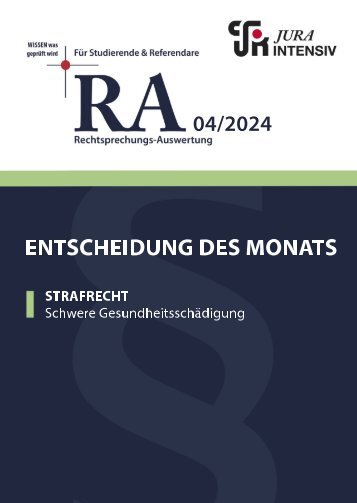
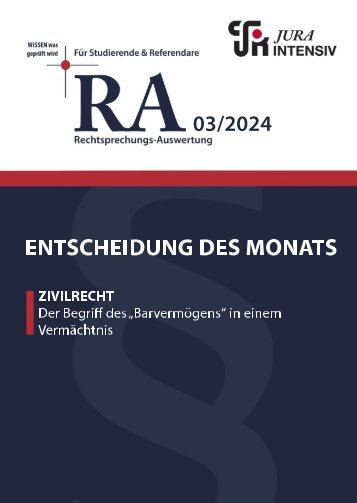
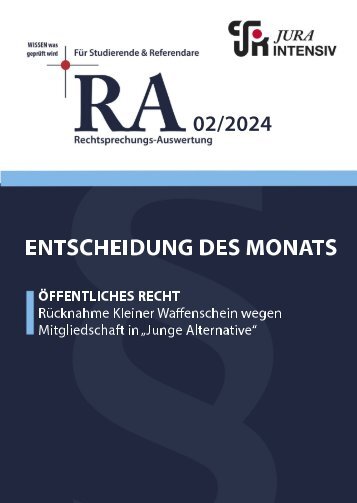
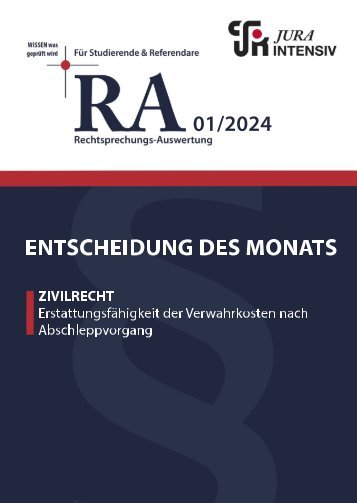

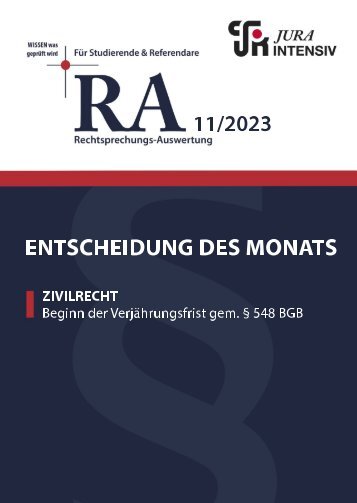
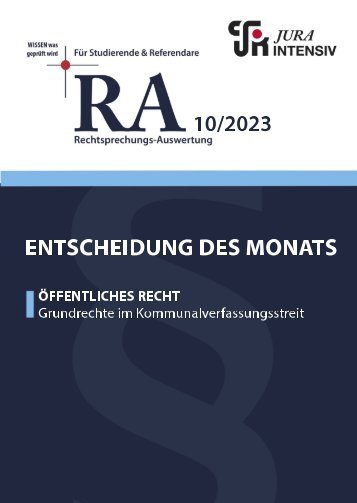
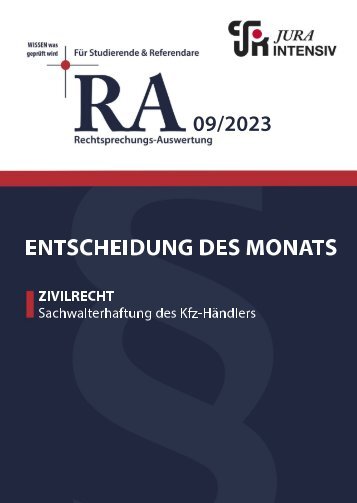
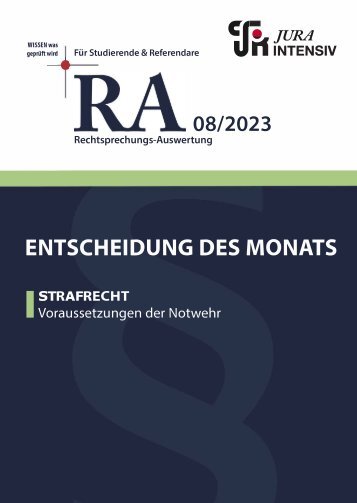
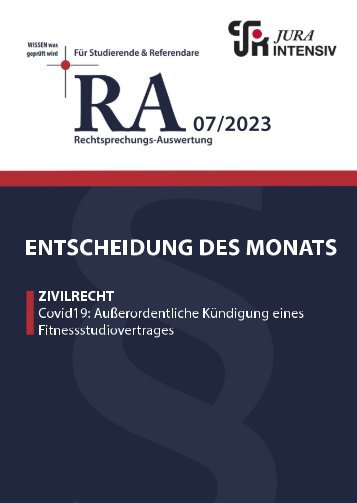
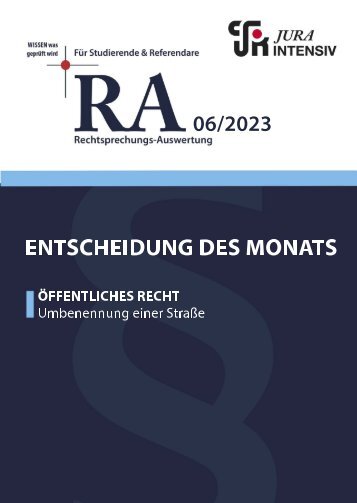
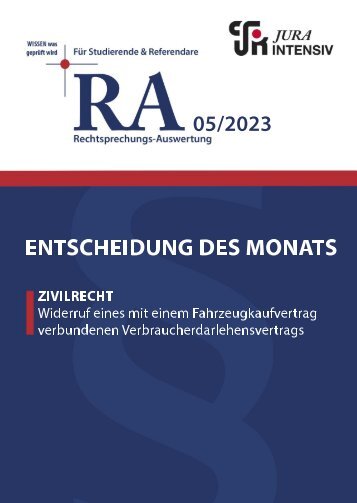
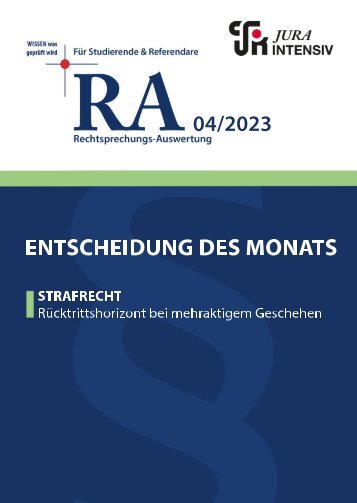
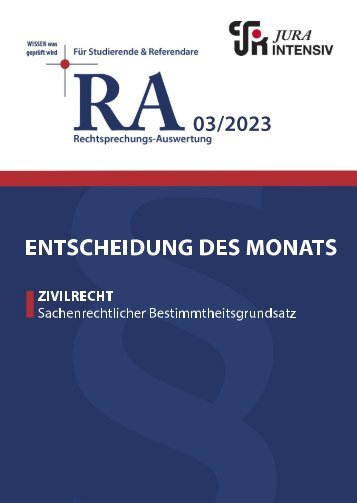
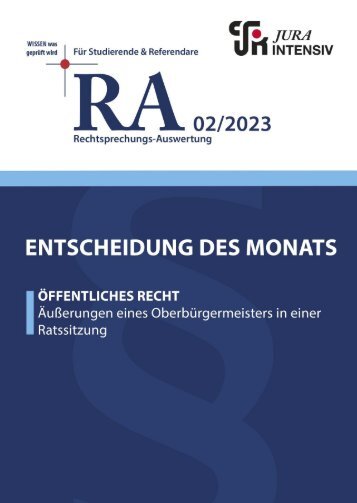
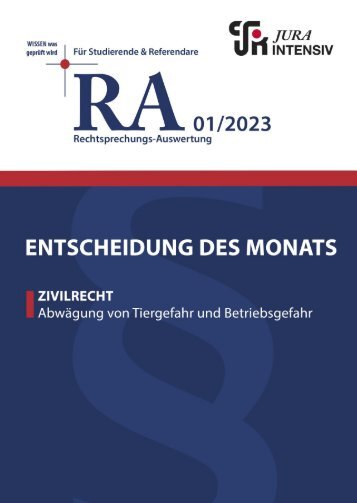

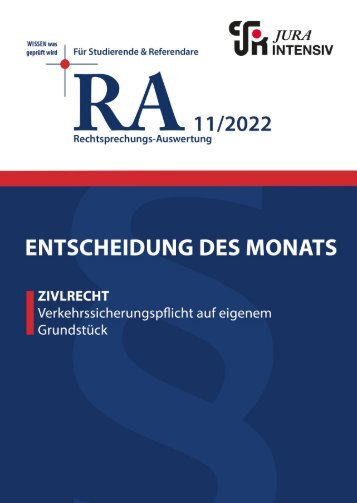
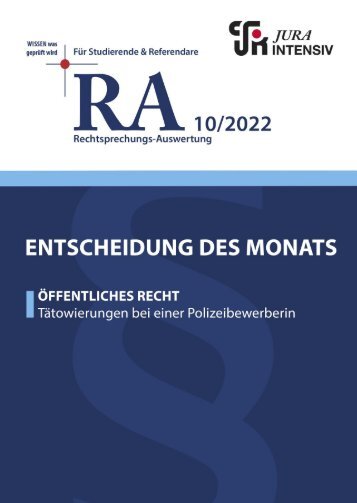
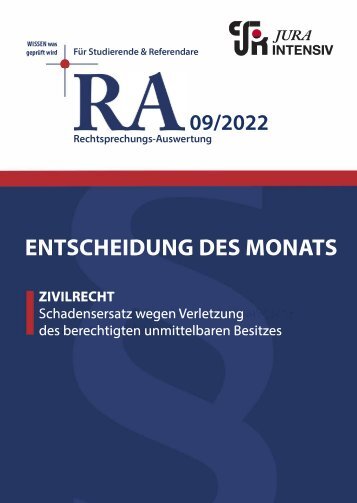
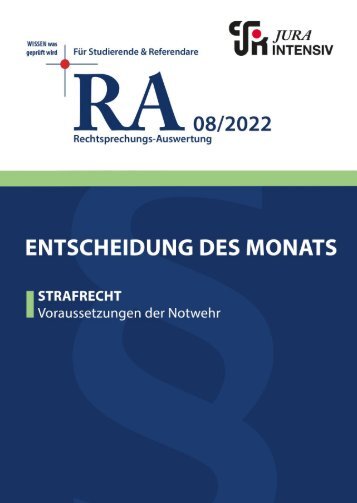
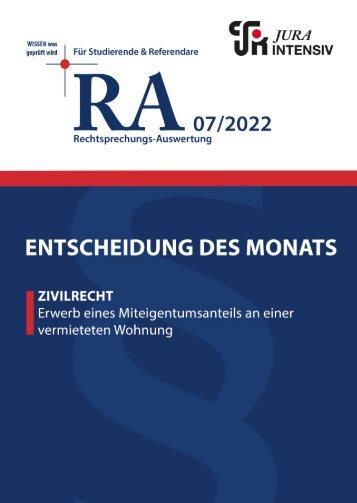
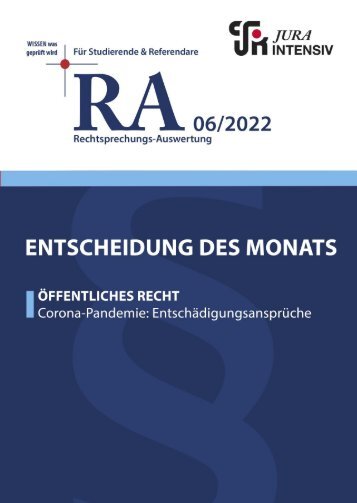

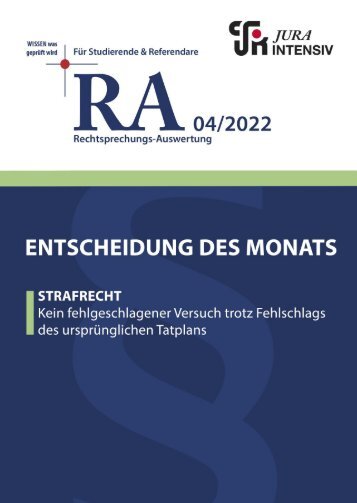

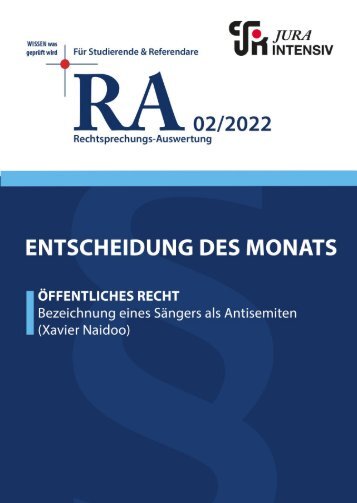
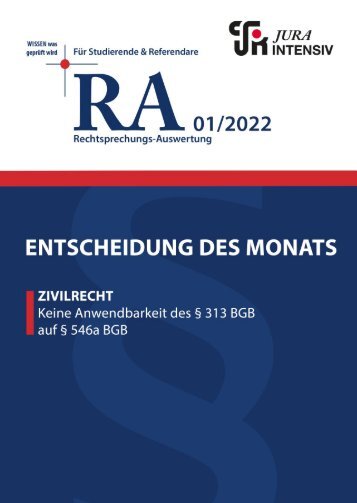
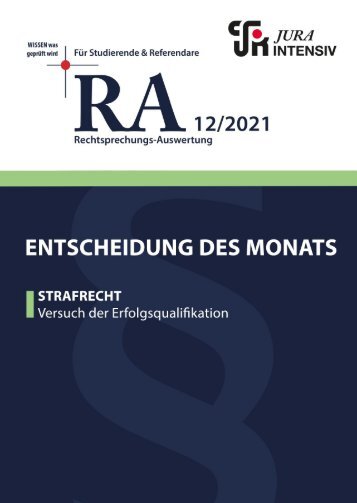
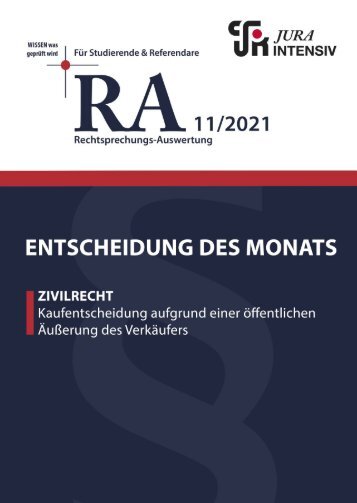
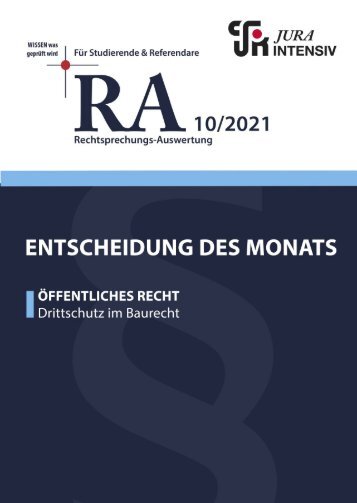

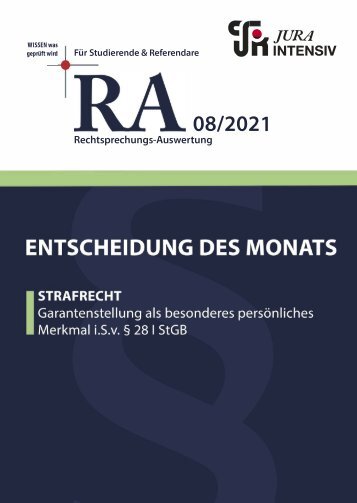
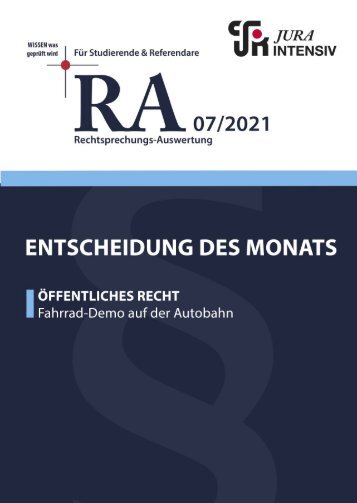

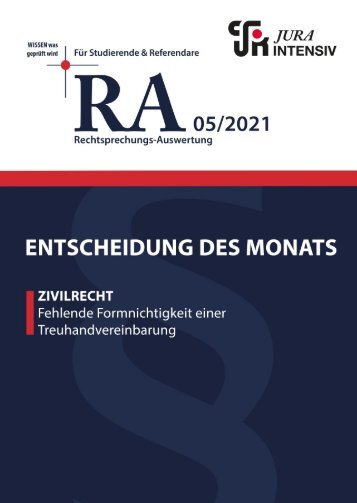
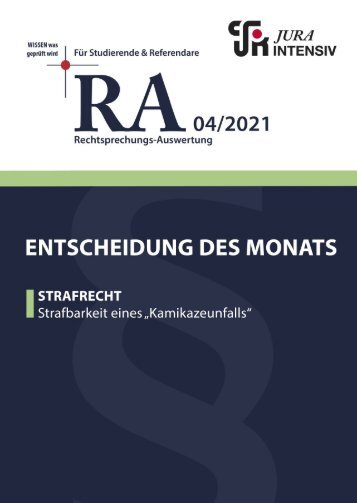

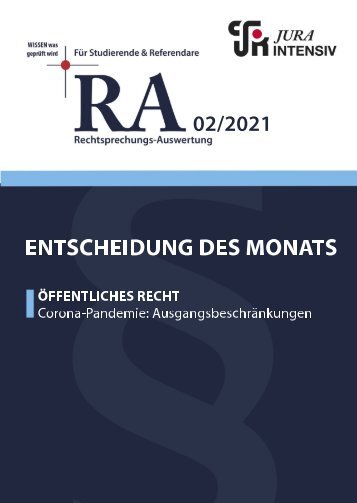

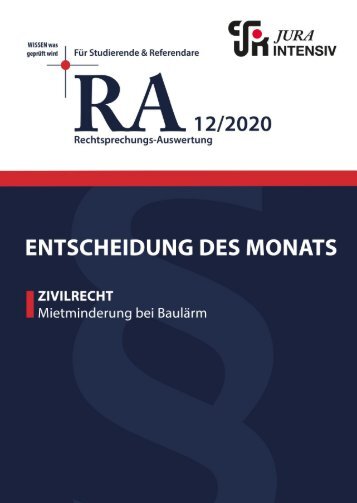
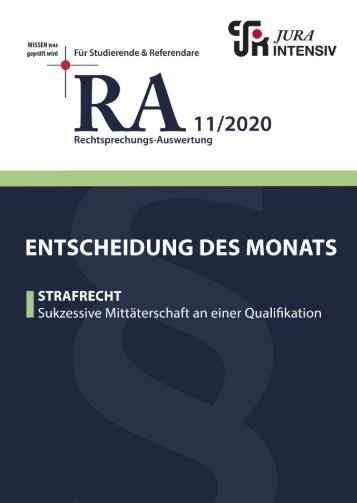
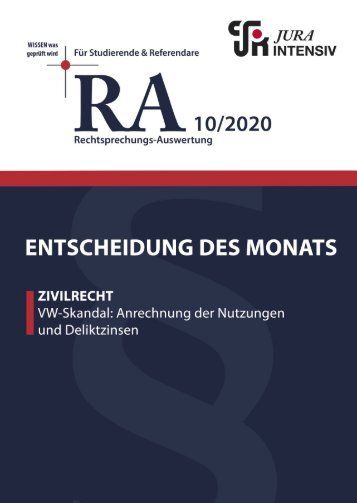
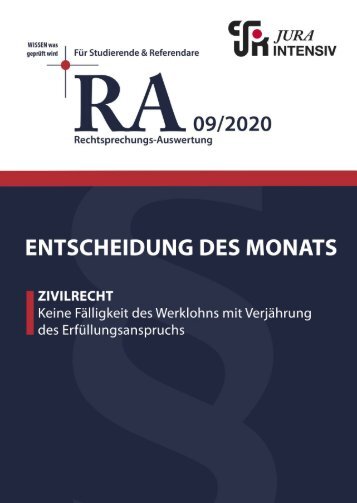

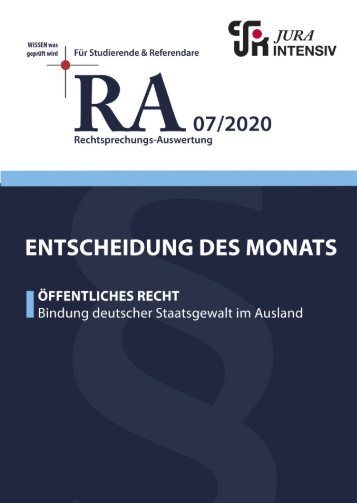
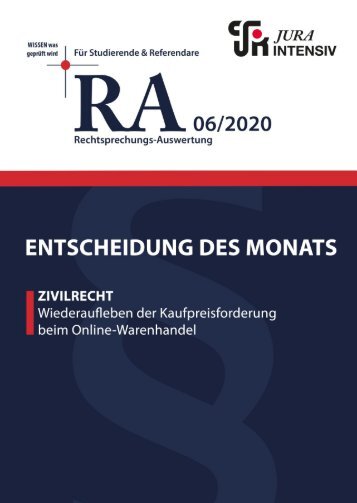
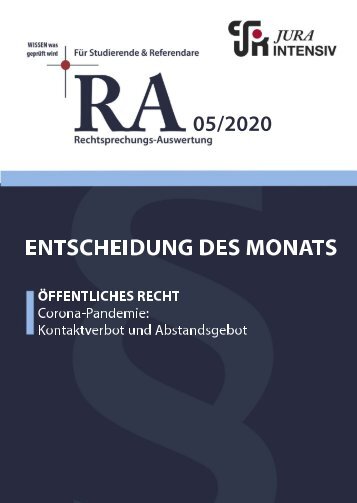
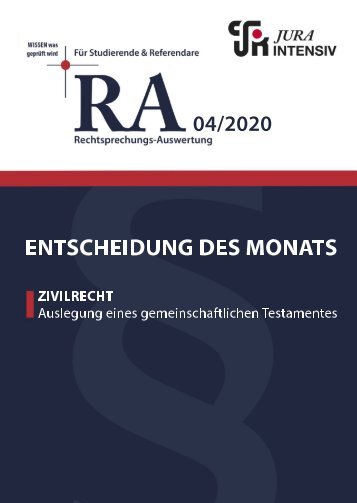
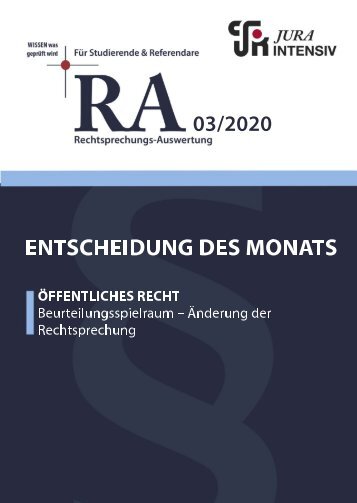

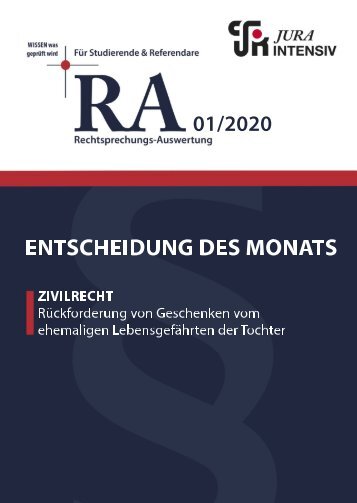

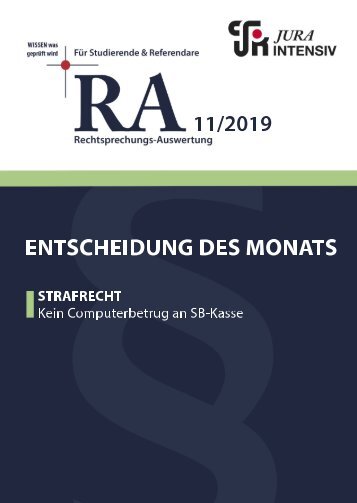
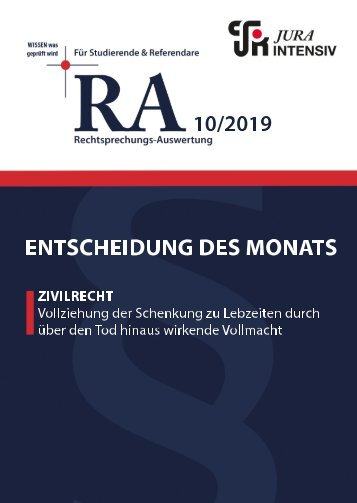
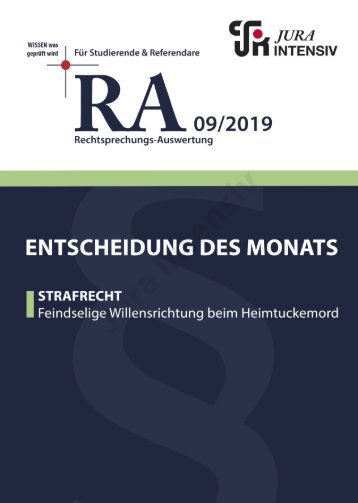


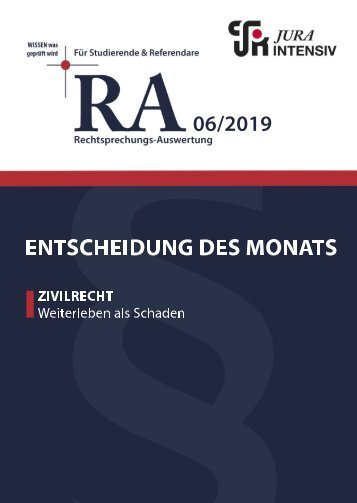
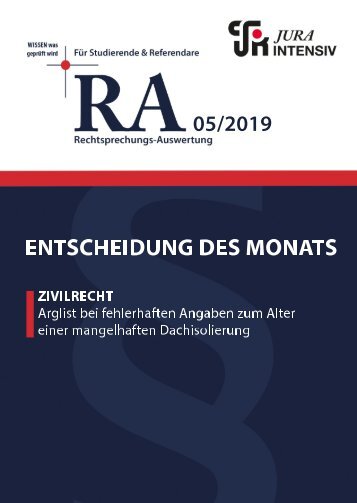
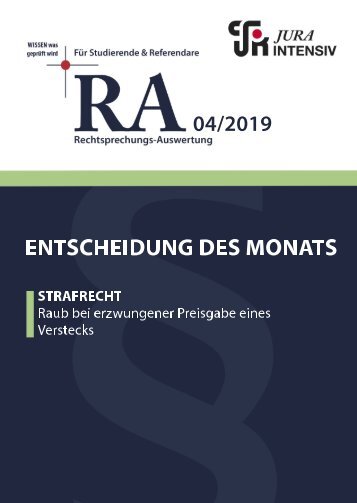
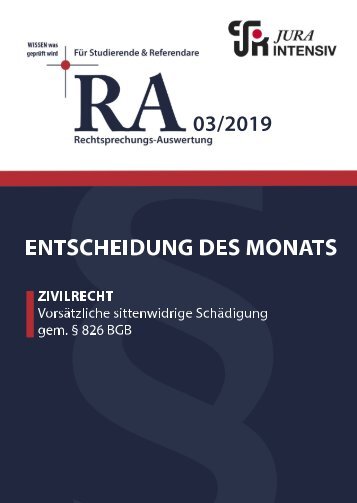
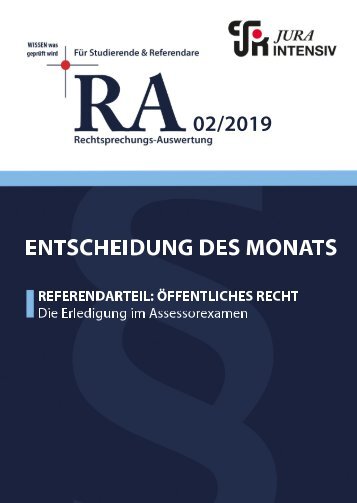

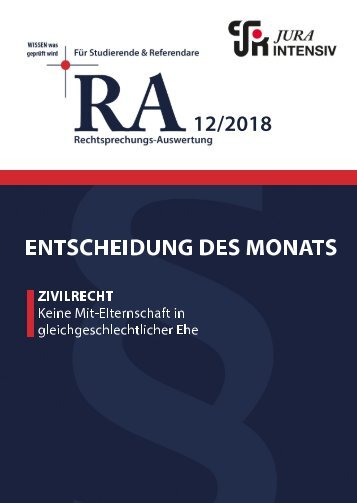

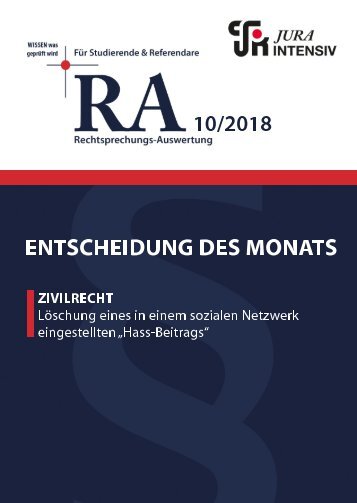


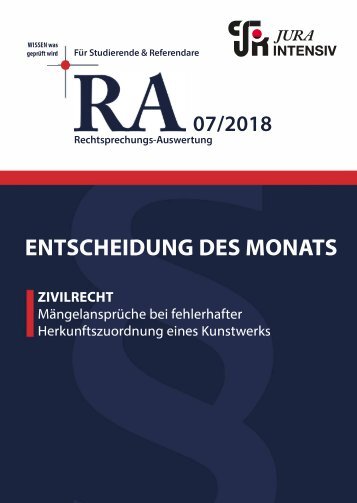
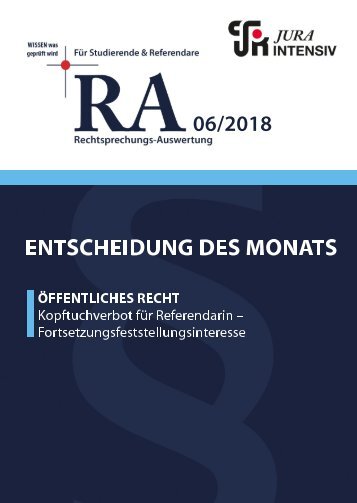
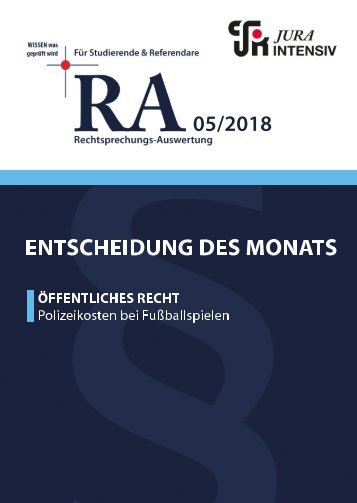
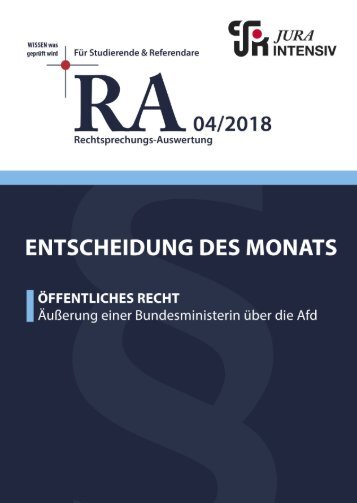
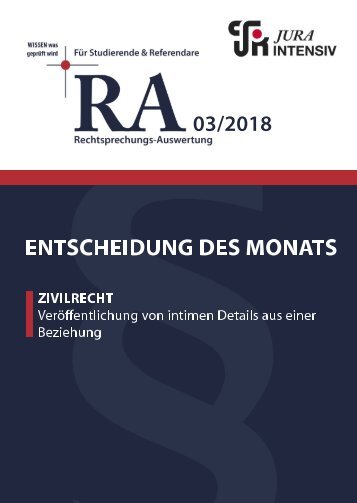
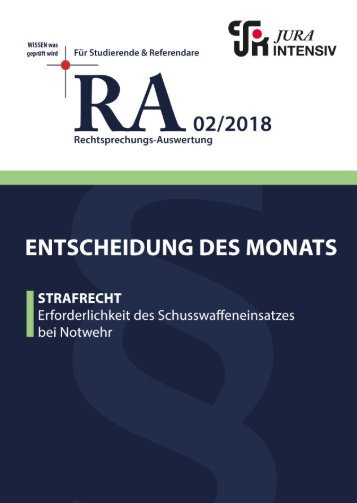
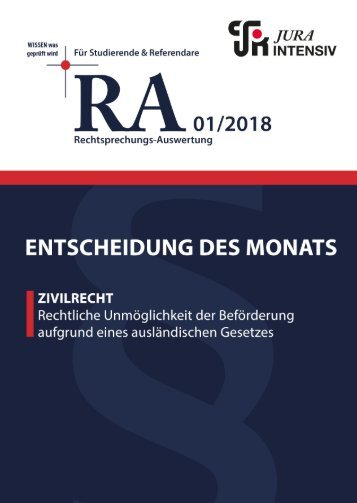
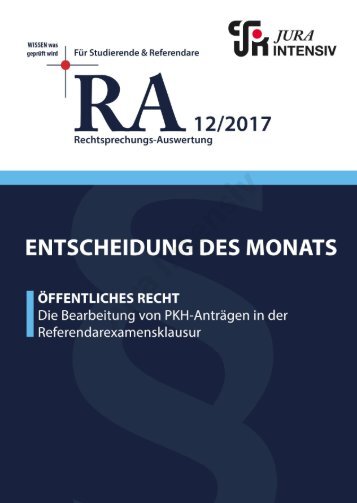
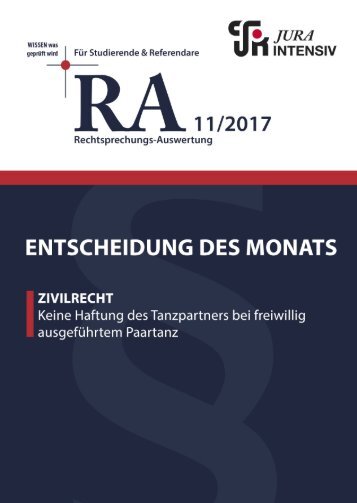
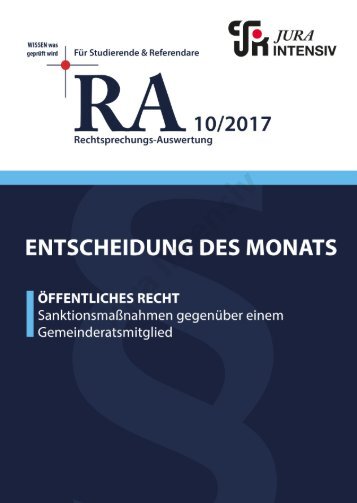

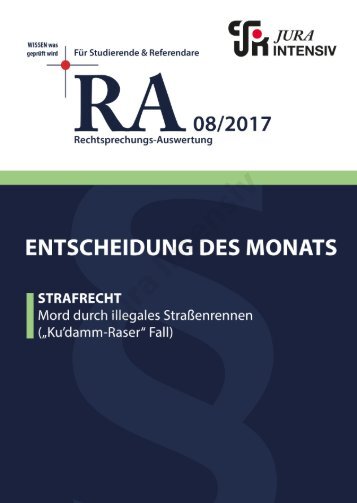

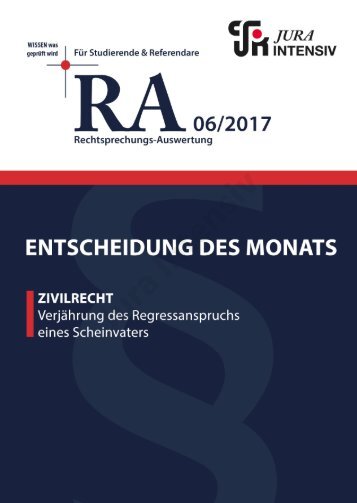




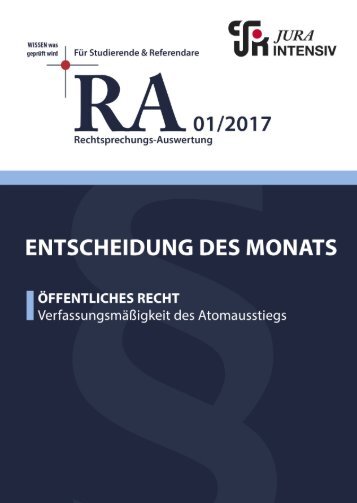
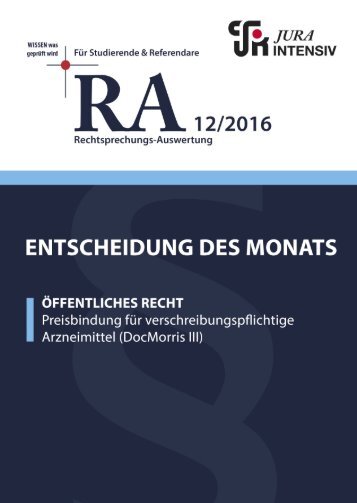
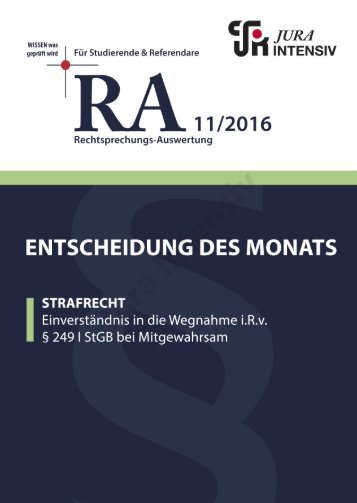
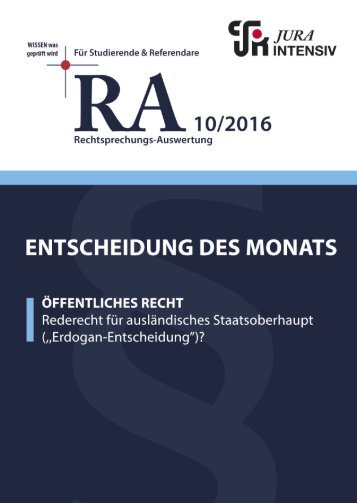

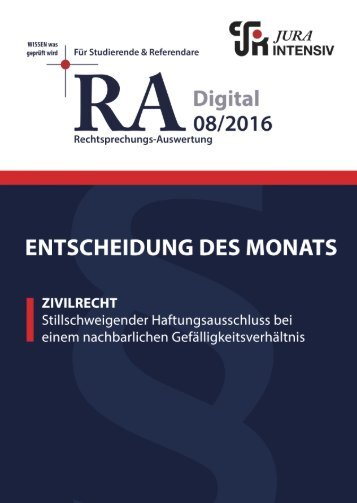
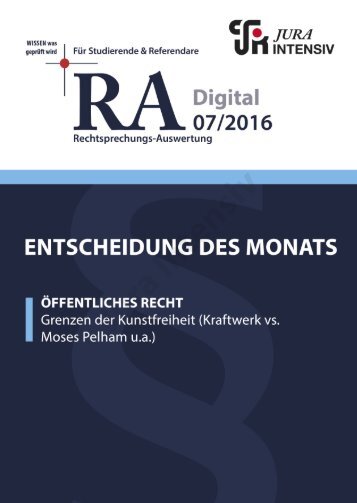


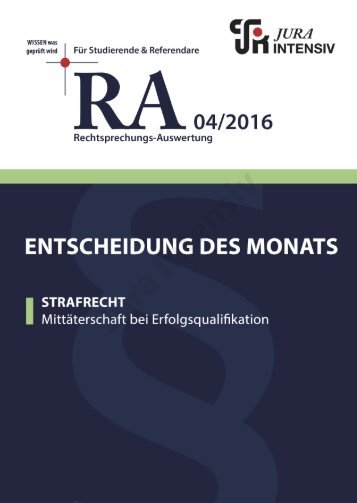
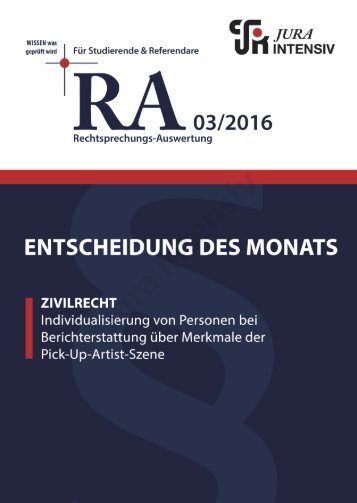
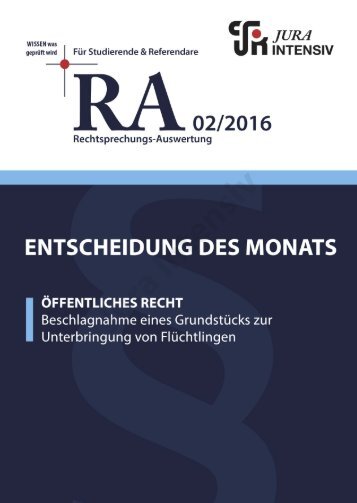
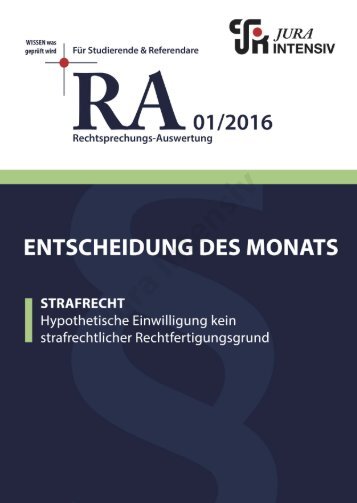
Follow Us
Facebook
Twitter